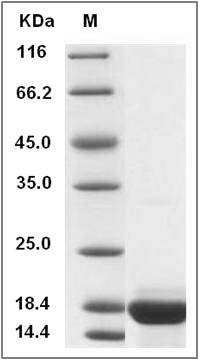-
Product Name
Rhesus TNFSF10/TRAIL/APO-2L (CD253) recombinant protein
- Documents
-
Description
Tumor necrosis factor ligand superfamily member 10 (TNFSF10), also known as TNF-related apoptosis-inducing ligand (TRAIL), Apo-2 ligand, and CD253, is a cytokine that belongs to the tumor necrosis factor (TNF) ligand family. TNFSF10 / Apo-2L / CD253 functions as a ligand that induces the process of cell death called apoptosis. TNFSF10 / TRAIL shows homology to other members of the tumor necrosis factor superfamily. As one member of the cluster of differentiation system, TNFSF10 / CD253 is commonly used as cell markers in immunophynotyping. Different kinds of cells in the immune system can be identified through the surface CD molecules which associating with the immune function of the cell. There are more than 320 CD unique clusters and subclusters have been identified. Some of the CD molecules serve as receptors or ligands important to the cell through initiating a signal cascade which then alter the behavior of the cell. Some CD proteins do not take part in cell signal process but have other functions such as cell adhesion TNFSF10 / Apo-2L / CD253 / TRAIL binds to several members of TNF receptor superfamily including TNFRSF10A / TRAILR1, TNFRSF10B / TRAILR2, TNFRSF10C / TRAILR3, TNFRSF10D / TRAILR4, and possibly also to TNFRSF11B/OPG. The activity of TNFSF10 / TRAIL may be modulated by binding to the decoy receptors TNFRSF10C / TRAILR3, TNFRSF10D/TRAILR4, and TNFRSF11B/OPG that cannot induce apoptosis. The binding of this protein to its receptors has been shown to trigger the activation of MAPK8 / JNK, caspase 8, and caspase 3. Alternatively spliced transcript variants encoding different isoforms have been found for this gene.
-
Protein name
Tumor necrosis factor ligand superfamily member 10 isoform 1
-
Protein short names
A330042I21RIK; LY81; CD253; TL2; TRAIL; APO2L; AI448571; APO-2L; TNFSF10
-
Uniprot ID
F6S9W7
-
Gene Name
TNFSF10
-
Source/Expression Host
E. coli
-
Expression Plasmid/cDNA
A DNA sequence encoding the rhesus TNFSF10 (NP_001252963.1) (Val114-Gly281) was expressed and purified with an initial Met.
-
Protein Species
Rhesus
-
Molecular weight
The recombinant rhesus TNFSF10 consists of 169 amino acids and has a calculated molecular mass of 19.6 kDa.
-
Purity
> 98 % as determined by SDS-PAGE
-
Activity
1. Measured in a cytotoxicity assay using L-929 mouse fibroblast cells in the presence of the metabolic inhibitor actinomycin D. The ED50 for this effect is typically 0.5-2 ng/mL.
2. Measured by its binding ability in a functional ELISA. Immobilized Rhesus TNFSF10 at 10 μg/ml (100 μl/well) can bind Rhesus TNFRSF10D-Fc (Cat:503391), The EC50 of Rhesus TNFRSF10D-Fc (Cat:503391) is 7.8-18.1 ng/ml. -
Validations

Cynomolgus TNFSF10 / TRAIL / APO-2L Protein SDS-PAGE
Related Products / Services
Please note: All products are "FOR RESEARCH USE ONLY AND ARE NOT INTENDED FOR DIAGNOSTIC OR THERAPEUTIC USE"
